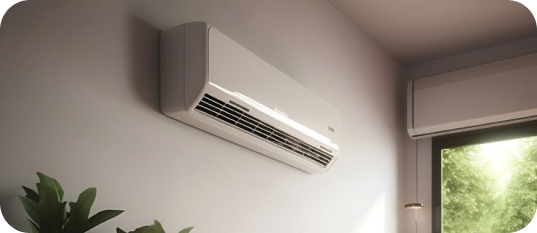Eco-Friendly Residential HVAC Solutions: Reduce Your Carbon Footprint

Homeowners are increasingly seeking ways to live more sustainably while cutting down on energy costs. Your HVAC system plays a significant role in your home’s energy consumption, accounting for nearly half of your household energy use. Choosing eco-friendly HVAC solutions is not only better for the environment but can also lead to substantial long-term savings. Residential HVAC.
1. High-Efficiency Heat Pumps
Heat pumps transfer heat between the indoors and outdoors, making them incredibly energy-efficient.
How They Work:
- In the winter, heat pumps extract warmth from the outside air or ground and bring it indoors.
Benefits of High-Efficiency Heat Pumps:
- Energy Savings: Modern heat pumps can reduce energy use by up to 50% compared to traditional HVAC systems.
- Lower Carbon Footprint: By relying on electricity rather than fossil fuels, heat pumps produce fewer greenhouse gas emissions.
- Year-Round Comfort: Heat pumps provide both heating and cooling in one system.
Best For:
- Homes in moderate climates, although advancements in cold-climate heat pumps make them suitable for colder regions as well.
2. Geothermal Systems
Residential HVAC Ronkonkoma includes geothermal HVAC systems that harness the Earth’s stable underground temperatures to heat and cool your home.
How They Work:
- A geothermal heat pump circulates fluid through underground pipes, absorbing heat from the Earth in the winter and releasing it in the summer.
- The system uses this heat exchange to maintain comfortable indoor temperatures.
Benefits of Geothermal Systems:
- Extremely Energy-Efficient: Geothermal systems can be up to 400% efficient, meaning they produce four units of energy for every unit consumed.
- Long Lifespan: Underground components can last 50+ years, while the indoor heat pump typically lasts 20–25 years.
- Environmentally Friendly: They reduce reliance on fossil fuels and significantly lower greenhouse gas emissions.
Best For:
- Homeowners with ample yard space for installing underground loops.
3. Solar-Powered HVAC Systems
How They Work:
- Solar panels generate electricity that powers your HVAC system, reducing reliance on grid electricity. Residential HVAC.
Benefits of Solar-Powered HVAC Systems:
- Renewable Energy Source: Solar energy is clean and sustainable.
- Lower Energy Bills: Once installed, solar panels significantly reduce or eliminate electricity costs.
- Tax Incentives: Many regions offer tax credits and rebates for installing solar energy systems.
Best For:
- Homes with good sun exposure and enough roof or yard space for solar panel installation.
4. Smart Thermostats for Enhanced Efficiency
While not an HVAC system itself, a smart thermostat is a critical component of any eco-friendly HVAC setup.
How They Work:
- Smart thermostats allow you to program and automate your heating and cooling schedules based on your lifestyle.
- Many models learn your preferences over time and make energy-saving adjustments automatically.
Benefits of Smart Thermostats:
- Energy Savings: Reduces unnecessary heating and cooling, cutting energy consumption by up to 10–15%.
- Convenience: Remote control via smartphone apps makes adjustments easy, even when you’re not home.
- Enhanced Insights: Provides data on energy usage, helping you identify opportunities to save.
Best For:
- Any home looking to optimize HVAC efficiency without a full system upgrade.
5. Energy Recovery Ventilators (ERVs)
ERVs are an eco-friendly addition to your HVAC system, improving indoor air quality while conserving energy.
Benefits of ERVs:
- Improved Air Quality: Reduces indoor air pollutants and increases ventilation.
- Energy Efficiency: Minimizes energy loss during air exchanges.
- Year-Round Comfort: Balances humidity levels for greater comfort.
Best For:
- Homes in climates with extreme temperatures or high humidity.
Why Choose Eco-Friendly HVAC Solutions?
Switching to sustainable HVAC systems offers a host of benefits:
- Cost Savings: While initial installation may be higher, energy-efficient systems reduce utility bills over time.
- Enhanced Comfort: Modern eco-friendly systems often provide better temperature control and air quality.
- Future-Proofing: As energy costs rise and environmental regulations tighten, eco-friendly HVAC systems will keep your home compliant and efficient.
Conclusion
Eco-friendly residential HVAC solutions like high-efficiency heat pumps, geothermal systems, and solar-powered options can help you reduce your carbon footprint while enjoying lower energy costs and enhanced comfort. With advancements in technology and growing incentives for sustainable upgrades, there’s never been a better time to go green with your home’s heating and cooling.
Contact a trusted HVAC professional today to explore the best options for your home and start your journey toward a more sustainable future. Residential HVAC.
See Also: How Lawn Pest Spraying Protects Your Yard from Damage.
FAQs
1. Are eco-friendly HVAC systems more expensive to install?
Yes, the initial cost may be higher for systems like geothermal heat pumps or solar-powered HVAC, but the long-term energy savings often offset the upfront investment.
2. Do heat pumps work in extremely cold climates?
Yes, modern cold-climate heat pumps are designed to operate efficiently in temperatures as low as -15°F.
3. Can I retrofit my current HVAC system to be more eco-friendly?
Yes, adding components like smart thermostats, ERVs, or solar panels can enhance the efficiency of your existing system.




